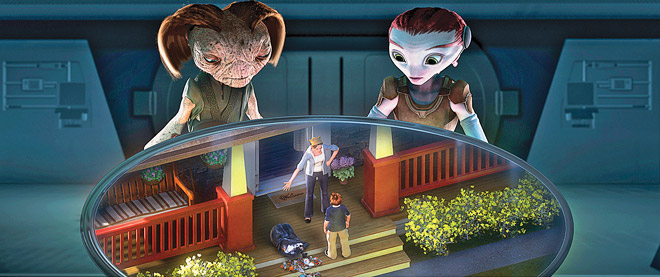Danger. Loss. Pain. Death. For kids.
The author of ‘Mars Needs Moms,’ now a Disney film, doesn’t believe in sheltering children
Share

“I seem to attract critical controversy in nearly every area,” Berkeley Breathed told Maclean’s. The cartoonist’s name doesn’t mean a lot to the target audience for Mars Needs Moms, the animated film adaptation of his 2007 children’s book. But to his older fans, the tough content of his kids’ literature won’t come as much of a surprise. As artist and writer of Bloom County (and two spinoffs), Breathed won a Pulitzer Prize for mixing politics with comic strips. With his illustrated books for kids, he’s courting a different controversy: whether it’s acceptable to have dark content in such books. “A good story is compelling to children because there are stakes involved,” he says. “Danger. Loss. Pain. Death.” All of which is heavier than Goodnight, Moon.
Most of Mars Needs Moms isn’t exactly shocking to kids or the parents who read it with them: a boy learns to appreciate the value of mothers when his own is abducted by Martians who need someone to drive them to soccer practice. But Breathed threw in a last-minute plot twist, one that he’s not reluctant to give away at this point: “I had the mother in Mars Needs Moms sacrifice herself without hesitation for her child,” teaching the hero what motherhood really means when she’s willing to die to protect him.
Breathed says that the emotional impact of this moment was not too much for kids to take because the mother was saved in the end, and sadness can “be handled with majestic ease by kids, as long as you end the story appropriately.” But the book’s original potential publisher didn’t feel that way and turned it down, forcing Breathed to find someone else. And when it was published, critical reaction was split; a reviewer for Publisher’s Weekly called the book “more painful than funny” and found sexism in its message about motherly self-sacrifice. When the film version was being made, some people showed “great concern about having a mother in fatal jeopardy during the entirety of the film story,” he adds.
Complaints about Bloom County didn’t stop Breathed from drawing his characters mooning oil executives, and any troubles with Moms haven’t changed his approach to children’s books. A recent book, Pete & Pickles, includes imagery of drowning and death. He explains he doesn’t see this content as dark, but more “emotional, or, more to the point, traumatic. It’s avoided in picture-book literature, which I find silly.”
This may just be a way of bringing some of the more tough-minded traditions of full-fledged children’s novels to the sweeter world of illustrated books. The little deer’s mom dies in both the book and movie of Bambi, but Breathed feels that though authors like Chris Van Allsburg (The Polar Express) managed to add “a serious approach to the dramatic narrative” in this type of story, “picture books generally haven’t been invested in telling powerful stories, as opposed to happy or educational ones. Their mission has been to comfort on a very superficial level.” Breathed argues that a happy ending is more satisfying for kids if it comes after something sad: his hero’s mom was saved, “but not before clearly suffering. That was the whole point.”
There are signs, four years after the publication of Moms, that this approach is becoming more acceptable. The motion-capture movie version, released by Disney on March 11, departs from Breathed’s visual style, but Breathed is happy to report that one thing it doesn’t change is that important, traumatic story point: calling it “startlingly intact,” he says that “the filmmakers fought to keep that element, much to their credit.” And movie companies don’t seem scared off by the content. Last month, DreamWorks animation announced that it had bought the rights to Breathed’s Flawed Dogs, an illustrated novel about a dog who gets shot, hit by a car, and loses a leg, provoking one Amazon customer reviewer to write that “I don’t want to read about those things myself, much less read them to my daughter.” That criticism is fine with Breathed: “Political correctness has always dogged me,” he says, “and there is hands down no more a citadel of PC than children’s literature.” If you can fight PC with a comic strip penguin, why not Martians?